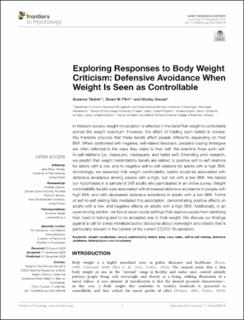| dc.contributor.author | Täuber, Susanne | |
| dc.contributor.author | Flint, Stuart W. | |
| dc.contributor.author | Gausel, Nicolay | |
| dc.date.accessioned | 2021-04-09T12:55:08Z | |
| dc.date.available | 2021-04-09T12:55:08Z | |
| dc.date.created | 2020-11-18T11:08:21Z | |
| dc.date.issued | 2020 | |
| dc.identifier.citation | Frontiers in Psychology. 2020, 11:598109. | en_US |
| dc.identifier.issn | 1664-1078 | |
| dc.identifier.uri | https://hdl.handle.net/11250/2737160 | |
| dc.description.abstract | In Western society, weight moralization is reflected in the belief that weight is controllable across the weight spectrum. However, the effect of holding such beliefs is unclear. We therefore propose that these beliefs affect people differently depending on their BMI. When confronted with negative, self-related feedback, people’s coping strategies are often reflected in the ways they relate to their self. We examine three such self-to-self relations (i.e., reassured, inadequate, and hated self). Extending prior research, we predict that weight controllability beliefs are related to positive self-to-self relations for adults with a low, and to negative self-to-self relations for adults with a high BMI. Accordingly, we expected that weight controllability beliefs would be associated with defensive avoidance among people with a high, but not with a low BMI. We tested our hypotheses in a sample of 348 adults who participated in an online survey. Weight controllability beliefs were associated with increased defensive avoidance in people with high BMI, and with decreased defensive avoidance in adults with a low BMI. Forms of self-to-self relating fully mediated this association, demonstrating positive effects on adults with a low, and negative effects on adults with a high BMI. Additionally, in an open ending section, we found seven social settings that deprive people from satisfying their need to belong and to be accepted due to their weight. We discuss our findings against a call for a less moralized public discourse about overweight and obesity that is particularly relevant in the context of the current COVID-19 pandemic. | en_US |
| dc.language.iso | eng | en_US |
| dc.publisher | Frontiers | en_US |
| dc.rights | Navngivelse 4.0 Internasjonal | * |
| dc.rights.uri | http://creativecommons.org/licenses/by/4.0/deed.no | * |
| dc.subject | weight moralization | en_US |
| dc.subject | obesity controllability beliefs | en_US |
| dc.subject | body mass index | en_US |
| dc.subject | self-to-self relating | en_US |
| dc.subject | defensive avoidance | en_US |
| dc.subject | belongingness and acceptance | en_US |
| dc.title | Exploring responses to body weight criticism: Defensive avoidance when weight is seen as controllable | en_US |
| dc.type | Peer reviewed | en_US |
| dc.type | Journal article | en_US |
| dc.description.version | publishedVersion | en_US |
| dc.rights.holder | © 2020 Täuber, Flint and Gausel. | en_US |
| dc.subject.nsi | VDP::Samfunnsvitenskap: 200::Psykologi: 260 | en_US |
| dc.source.volume | 11 | en_US |
| dc.source.journal | Frontiers in Psychology | en_US |
| dc.identifier.doi | 10.3389/fpsyg.2020.598109 | |
| dc.identifier.cristin | 1849156 | |
| dc.source.articlenumber | 598109 | en_US |
| cristin.ispublished | true | |
| cristin.fulltext | original | |
| cristin.qualitycode | 2 | |

